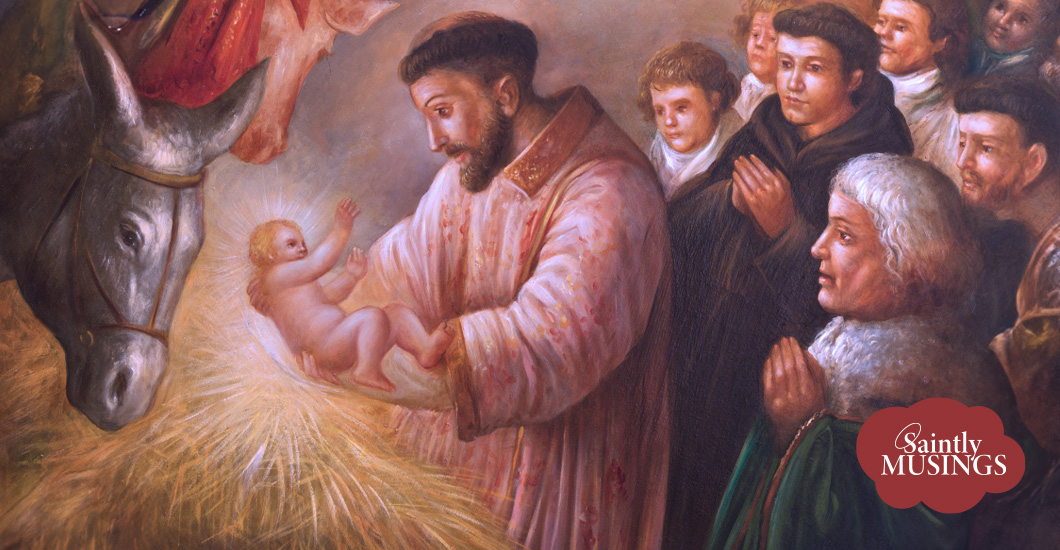Trending Articles
Mother Knows Best: Six Timeless Lessons For Lent
Your mother knows more than you think. Long ago, when you were just a wee child, picking at your oatmeal, Mom persuaded you to clean your bowl by peppering her speech with pearls of wisdom. At the time, those pearls may have seemed like nothing more than motherly machinations. And chances are, they resulted in more eye-rolling than oatmeal-eating.
Yet, the clichés that rolled off her tongue with such seeming sadism were, in truth, some of the soundest theological summations on suffering and sacrifice known to man. Her truisms, aphorisms, maxims and dictums distilled about 2,000 years of Catholic teaching into one-liners so simple that a five year old could understand them, but so profound that a 55 year old can still learn from them.
The fact is, almost everything you need to know about Lenten sacrifice, you learned from your mother. Let us review.
1.“Offer it Up”
Believe it or not, this is not Catholic code for “Get over it.” It is a call to practice the daily habit of self-sacrifice, a prerequisite for sainthood.
Sainthood, after all, consists in perfect conformity to the will of God. On the whole, it is much smarter to prefer God’s will over one’s own, so you would think that choosing it would not be all that hard. But fallen human beings are not always known for our smarts. In our sin, we show a decided and persistent preference for our own will. Overcoming that preference requires two things: grace and practice. The grace part is mostly up to God. We can and should maximize our opportunities for receiving grace, but grace is still His thing. The practice part, however, is ours.
Every day, we have about 1,436 opportunities to deny ourselves. Occasionally, such denial may not be wise. But more often than not, it is wisdom personified. The more we give up something little that we do want—eating a second piece of pie or sleeping an extra thirty minutes—and do something we do not want—eating our peas, getting up to play with the kids, and watching Veggie Tale’s “Lord of the Beans” for the 8,547th time—the better we get at denying our imperfect will and choosing God’s perfect one.
2.“Think of All the Poor Children Starving in Africa”
Or, better yet, think of all the poor people suffering in your family, your neighborhood, or your parish. They stand to benefit much more from your sacrifices now than those starving Africans benefited from your plate cleaning back then.
That is because when you offer up sacrifices—great and small— you actually join them to Christ’s own suffering and sacrifice. United to Him, through God’s gracious permission, those little sacrifices “complete what is lacking in Christ’s afflictions for the sake of his body, that is the Church” (Colossians 1:24). In other words, every time you make a sacrifice of your own will and desires, in some small way you help obtain grace for your friends, family, and yes, the hungry kids in Darfur.
3.“It’s the Little Things That Count”
Thank Saint Thérèse of Lisieux for that one. In days gone by, many a Catholic suffered from the misapprehension that only grand, glorious, and gigantic sacrifices counted, i.e. fasting for forty days and forty nights, sitting atop a pillar for twenty years, and wearing the latest in hair shirts. Saint Thérèse, with her Little Way, reminded the Church that the little sacrifices matter as well—that, in fact, they often matter more.
Hair shirts are all well and good, of course, (although a good spiritual director should be consulted before you don one), but all the hair shirts in the world are not worth much if we cannot make the little sacrifices charity demands—holding our tongues, turning the other cheek, or listening to another’s problems rather than talking about our own.
Not only does charity demand little sacrifices, so does our station in life. Most of us are not called to sit atop pillars: We are called to care for our children, help our spouses, and be nice to our neighbors. The sacrifices God wants us to make are usually found in the daily duties associated with those calls. They are rarely great and even more rarely exotic: The sacrifice of watching a friend’s children so that she can get some cleaning done is unlikely to come up in canonization proceedings. Nonetheless, sacrifices such as those pave the path to sainthood.
They also present us with far fewer temptations to spiritual pride. Out-fasting all our friends could fool us into thinking that we are holier than the rest of those self-indulgent gluttons. Eating what we are served without complaint does not have quite the same effect.
4.“God Loves a Cheerful Giver”
This one may top the list of Most Annoying Phrases Ever to Come Forth from Mom’s Mouth. Nevertheless, it still holds true.
A sacrifice is only as good as the attitude with which it is made. Sacrifices made grudgingly or resentfully, do not add much to the treasury of saints. They also do not do much for the giver’s soul. When we make a sacrifice—whether it is big or small, material or spiritual—we must not grumble or complain. Nor should we remind people of it again and again. The only thing worse than a grumpy giver is a giver who never lets others forget what has been given.
When making sacrifices, the same rules apply as when fasting: “Do not look dismal like the hypocrites, for they disfigure their faces so that their fasting may be seen by men. Truly, I say to you, they have received their reward. But when you fast, anoint your head and wash your face, that your fasting may be seen not by men, but by your Father who is in secret, and your Father who sees in secret will reward you” (Matthew 6:16-18).
5. “Because I Said So”
For all the good gifts God gives us, He still does not promise us that life on earth will be anything other than a valley of tears. And the truth is, the closer you get to God, the more seemingly senseless sacrifices He asks of you.
Consider Abraham, who was asked to give up his son, or Jacob, who had to die as a stranger in a foreign land. The prophets were regularly rode out of town on a rail. The apostles left home and family to die martyrs’ deaths. Saint Lucy lost her eyes. Saint Paul lost his head. Saint Francis lost his clothes. Many of the great Doctors of the Church—from Athanasius to Francis DeSales—spent all or part of their episcopacy in exile. Other saints died of leprosy, the plague, cholera, and worse.
Becoming a saint requires a willingness to make all those sacrifices and more. It requires a willingness to share in God’s own sufferings, not only by offering things up during Lent, but also by accepting the sufferings that come to us all year round, no matter how incomprehensible they may be. “If any man would come after me, let him deny himself and take up his cross and follow me” (Matthew 16:24).
Our acceptance of those crosses is what transforms them from mere suffering to sacrifice. To not question, to not demand understanding, to not rail at God and ask, “Why me,” is itself a sacrifice. The simple sacrifice of bowing our heads in submission to God and saying, with unwavering trust, “Thy will be done,” carries more weight with Him than that of a 100 fasts. It is also a hundred times more difficult.
6.“All You Have to Do Is Ask”
Our moms knew that for all their wisdom, their power to help us make any sacrifice—big or small—was limited. Ours is as well. We cannot give up anything without the help of grace. Trying to make sacrifices without calling for heavenly intervention is like driving a car on fumes: We will not get very far.
So do not try doing it on your own. When making the extraordinary sacrifices asked for during Lent and the ordinary sacrifices asked for every day of the year, ask for help.
Turn to the saints, who practiced heroic sacrifice during their time on earth. Turn to the Father, Son, and Holy Spirit, who have lived self gift through all eternity and call us to live in imitation of them. And turn to the Blessed Virgin Mary, who emptied herself to receive the Son of God into her womb, and who died to herself as she watched her beloved Son crucified on Calvary. No human person has understood sacrifice better or sacrificed more than her, and whatever we have not learned from our own mothers about sacrifice, we can learn from the mother of Christ.
Because mother really does know best.
Emily Stimpson is a freelance Catholic writer based in Steubenville, Ohio. Her books include “These Beautiful Bones: An Everyday Theology of the Body (Emmaus Road), “The Catholic Girl’s Guide for the Single Years (Emmaus Road), and her latest, co-authored with Brian Birch, “The American Catholic Almanac: A Daily Reader of Patriots, Rogues, and Ordinary People Who Changed the United States (Image). Stimpson is contributing editor to “Our Sunday Visitor” and a blogger for CatholicVote.org. Article originally appeared in The Catholic Table (www. TheCatholicTable.com). Reprinted with permission.
Latest Articles
Want to be in the loop?
Get the latest updates from Tidings!






